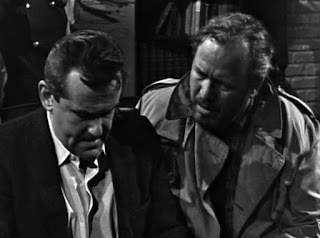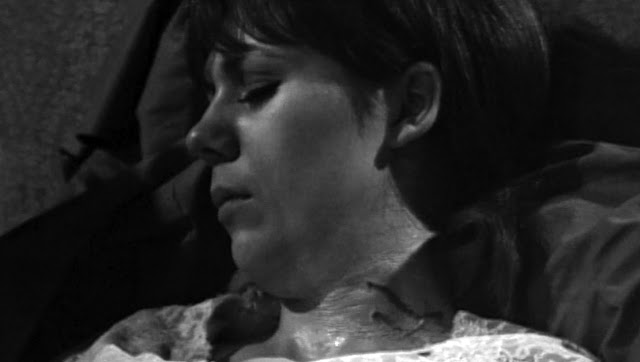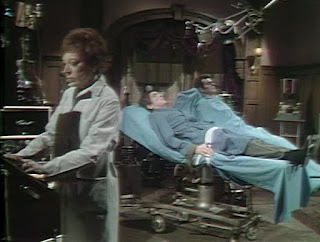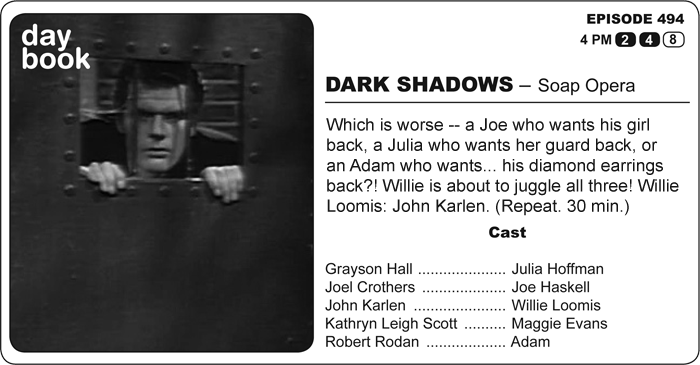By PATRICK McCRAY
Taped on this date in 1967: Episode 235
When Sam faces his last chance to confront Maggie’s danger, is he prepared to fight the impossible? Sam Evans: David Ford. (Repeat. 30 min.)
Seeing bite marks on Maggie’s neck, Sam wrestles with the origins and implications of Maggie’s assault. Seeing her dazed state and hearing Victoria’s reports, he tries to protect her further, but while a nurse is distracted, Maggie vanishes from the hospital by way of an open window.
It’s easy to get used to good acting on Dark Shadows. So much so that it often goes unmentioned. But then there’s David Ford. Like so many vets of the show, he was also a vet of Broadway, and his transposed appearance in the film of 1776 further evidences his acumen. (Theatre insiders who saw his Dickinson report that it was even more impressive than his Hancock.) The measured intensity of Sam Evans in 235 sells the terror of Barnabas as much as Jonathan Frid, himself. Although Dark Shadows very quickly becomes a paean to outsiders, it begins very differently, and as it should. In these early months, we move among the normal insiders of society, and the show does a convincing job of throwing that world into uncertainty and peril with the arrival of vampires and phoenixes. Eventually, the show moves to the other side of the coffin lid. But before we get used to Barnabas and Quentin, we see how disturbing it is to be a mortal among gods, and few are more mortal than Sam Evans.
 This episode could easily have turned into a tired-yet-subtle lecture on masculine arrogance. Today, it might have. Generalized Men have become incredibly safe targets for recriminating critique in the media, and Sam Evans is my Exhibit A to counteract this. He both represents ostensible male authority and displays perseverance in the face of its reevaluation. Yes, it will be deconstructed in this episode, but not as an all-knowing punishment or as guilt by association. It’s not sexist, it’s Shakespearean. No one could have known what was necessary to properly guard Maggie. In a poorly-written episode of the modern era, Sam would have been advised on the possibility of supernatural threats from the get-go. Of course, he would have rejected them. And of course, the implication would have been that he was blinded by rigid, masculine inflexibility, thus leading to his failure as parent and protector, etc, etc. Ron Sproat doesn’t play that game. The show skirts near implicating the fallibility of men, but instead does the more universal job of depicting fallibility, period. Because anyone would have made Sam’s choices. Or Joe’s. Or Woodard’s.
This episode could easily have turned into a tired-yet-subtle lecture on masculine arrogance. Today, it might have. Generalized Men have become incredibly safe targets for recriminating critique in the media, and Sam Evans is my Exhibit A to counteract this. He both represents ostensible male authority and displays perseverance in the face of its reevaluation. Yes, it will be deconstructed in this episode, but not as an all-knowing punishment or as guilt by association. It’s not sexist, it’s Shakespearean. No one could have known what was necessary to properly guard Maggie. In a poorly-written episode of the modern era, Sam would have been advised on the possibility of supernatural threats from the get-go. Of course, he would have rejected them. And of course, the implication would have been that he was blinded by rigid, masculine inflexibility, thus leading to his failure as parent and protector, etc, etc. Ron Sproat doesn’t play that game. The show skirts near implicating the fallibility of men, but instead does the more universal job of depicting fallibility, period. Because anyone would have made Sam’s choices. Or Joe’s. Or Woodard’s.
The attacks on Maggie become a rape metaphor with very little imagination. In a ham-fisted episode, someone would have been warning Sam about a potential attacker as he would have been waving it away in a whiff of omniscient privilege. But there is no warning. To Sam, in his innocence, an attack like that is more than unthinkable; it doesn’t even exist. He’s a true naif, but so are they and so are we. None in Collinsport can conceive of this attack as even possible. Maggie is the ultimate victim, here, and right behind her is Sam. No one is implicitly or explicitly to blame of anything except being in the wrong place at the wrong time, regardless of role or gender. By making no move in that regard, the show actually makes a fascinating and bold one. Bold in the 1960’s. Arguably beyond progressively egalitarian, now, because of how tempting it would be as fodder for painfully “relevant” commentary.
Bearded and robust, Sam Evans looks like the love child of Brian Blessed and God, making him a seeming straw man for a Statue of Liberty-sized misandry. Just as this makes him the perfect target, he’s just as perfect to see side-step becoming one. Opinionated at times, but never without a heart the size of China (and twice as fragile), his masculinity is a nourishing one, not toxic. Sam Evans is both parents, and he represents the best of them on the show, despite the alcoholism.
And he increases the intensity of the show’s terror, as well. With no agenda except to love his daughter, his reactions inform us as to the magnitude of the horror in Collinsport -- the horror of Barnabas and how transgressive it is. He sees the bite marks. He knows what they are. We know what they are. Fiction is now fact. You don’t just witness the parent of an attack victim. You meet a man whose boundaries of safety and definitions of reality are stripped away. If vampires are real, what the hell else is out there? It’s the job of a parent to stretch the truth when they say that everything is going to be okay. But few have been on the business end of the boogeyman as Sam Evans. There are no limits to the possible dangers, now, and with that is his realization that he has no power to stop any of it.
The show never could have sustained this level of existential dread, but rooting us in it roots us in the program’s sense of humanity. This establishes an emotional and ethical baseline, and as wild as the action becomes, we never stray from the terror experienced by everyone, including the monsters. We all share a fundamental need for safety, and safety is grounded in the footing of knowing what’s possible. That definition is tenuous in Dark Shadows -- even demons end with more questions than answers. Beginning that with a human parent is a crucial choice. Sam’s job as an artist makes him even more vital as our lens because it’s his job to represent reality, and doing so is important to him. He informs us early into the series that he’s not an abstract painter. Liz has such power and guilt that it’s hard to sympathize with her. Sam’s guilty, too, of lying on the witness stand, but the pressures and weaknesses experienced there are a tad more understandable. He’s a parent, not a paragon. Artist and parent, he’s joined in the dawning horror by Joe, who must be a realist to survive on the high seas. With them, and most tragic of all, perhaps, is Dave Woodard. He fights to understand the problem from every angle but the mythic. As physician, with the most power and responsibility, his late attendance at the party of the possible carries with it the most culpability for Maggie’s fate. Burke’s in that mix, as well. Materialists all, but not insensitive ones, their best estimates of reality leave them without a body, just an empty hospital bed. Robbed of all ability to protect, they are even robbed of the evidence of their failure.
Ron Sproat’s script is an admirably balanced mix of propulsive and meditative. In the wrong hands, it would have devolved into a tired lecture. Is it a warning against arrogance? No. Episode 235 is a strange comfort that true horror will come when and where we know it shouldn’t be possible. The comfort comes from reminding us that we are all together in that predicament. More than any genre, horror can unite as much as comment or divide. In 235, it had the chance to do the worst of the latter. Thanks to Ron Sproat and David Ford, it does the opposite.
This episode hit the airwaves May 19, 1967.




